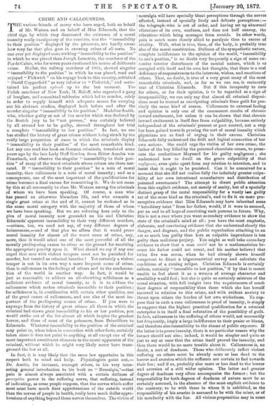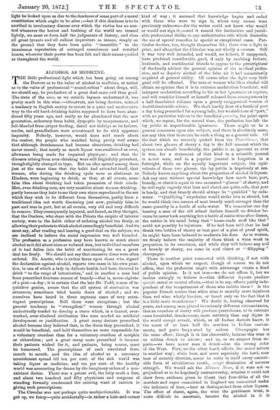CRIME AND CALLOUSNESS.
true of Christina Edmunds. But if this incapacity to care for others, or for their opinion, is to be regarded as a sign of irresponsibility, we can only say that almost all criminal disposi- tions must be treated as exculpating criminals from guilt for pre- cisely the same kind of reason. Callousness to external feeling and opinion is only one of the commonest results of chronic inward excitement, but unless it can be shown that that chronic inward excitement is itself free from culpability, because entirely independent of the criminals' present or past control, not a step has been gained towards proving the sort of moral insanity which physicians are so fond of urging in their excuse. Christina Edmunds fully understood the drift and logical connection of her own actions. She could urge the victim of her own crime, the father of the boy killed by the poisoned chocolate-cream, to prose- cute the confectioner Maynard for his guilty negligence ; she understood how to dwell on the grave culpability of that negligence, even quite apart from any relation to intention, and to insist that it ought to be punished. Can it be conceived for a moment that she did not realize fully the infinitely greater culpa- bility of her own intentional manufacture and distribution of poisoned sweetmeats ? The attempt to divert public attention from this explicit evidence, not merely of sanity, but of a specially distinct grasp of the moral responsibility for a vastly less guilty act of the same kind as the criminal's, and to fix it on mere pre- sumptive evidence that Miss Edmunds may have inherited some "hereditary taint" from her father, would, if it were to succeed, put an end to all hope of convicting such persons in future. Why, this is not a case where you want secondary evidence to show the state of the criminal's mind at all ; you have the most emphatic, elaborate, and convincing evidence that she understood clearly the danger, and disgrace, and the public reprobation attaching to an act as much less guilty than hers as culpable imprudence is less guilty than malicious perjury. You might as well take secondary evidence to show that a man could not be a mathematician be- cause his father could not count, and his mother believed that twice five was seven, when he had already shown himself competent to direct a trigonometrical survey and calculate the conditions of a coming eclipse. Christina Edmunds is certainly callous, certainly "insensible to her position," if by that is meant unable to feel about it as a woman of average character and sensibility would feel ; but she is quite as certainly mistress of the moral situation, with full insight into the requirements of much finer degrees of responsibility than those which she has herself incurred in relation to this crime, and with evident anxiety to thrust upon others the burden of her own wickedness. To sup- pose that in such a case callousness is proof of insanity, is simply to suppose that the highest practical qualification for a criminal enterprise is in itself a final refutation of the possibility of guilt. In fact, callousness to the suffering of others would, not necessarily but frequently, imply a large indifference to their praise or blame, and therefore also insensibility to the shame of public exposure. If the latter is to prove insanity, there is no particular reason why the former should not also ; indeed, it would be simpler and quite as just to say at once that the crime itself proved the insanity, and then there would be no more trouble about it. Callousness is, no doubt, a sort of deadness. Those who deliberately inflict violent suffering on others must be already more or less dead to the horror and aversion which the sufferers are certain to feel towards their foe; and if so, probably also more or less dead to the horror and aversion of a still wider opinion. The latter and greater degree of deadness very often accompanies the former ; but the responsibility for both degrees of deadness of nature must be as certainly assumed, in the absence of the most explicit evidence to the contrary, to be with those in whom it is exhibited, as the responsibility of his avarice is assumed to be with the miser, or of hensions of anything beyond those nerves themselves. The victim of his mendacity with the liar. All vicious propensities may in some THE various friends of mercy who have urged, both on behalf of Mr. Watson and on behalf of Miss Edmunds, that the chief sign by which they discovered the existence of a moral insanity really exculpatory of the convicts, was the "insensibility to their position" displayed by the prisoners, are hardly aware how very far that plea goes in excusing crime of all sorts. No one ever yet displayed more striking "insensibility to the position" in which he was placed than Joseph Lemettre, the murderer of the Pas de Calais, who for seven years continued his course of deliberate crime. Muller, the railway murderer of 1861, showed singular "insensibility to the position" in which he was placed, read and enjoyed " Pickwick " on his voyage back to this country, criticized '• David Copperfield " as very inferior to "Pickwick," and main- tained his perfect aplomb up to the last moment. The Polish murderer of New York, M. Ruloff, who organized a gang of burglars, and committed robberies which led to murder, solely in order to supply himself with adequate means for carrying out his abstract studies, displayed both before and after the murder singular "insensibility to his position." Madeline Smith, who, whether guilty or not of the murder which was declared by the Scotch jury to be "not proven," was certainly believed by all around her to be guilty, showed throughout her trial a complete "insensibility to her position." In fact, no one has studied the history of great crimes without being struck by the really large proportion of cases in which the criminals display "insensibility to their position" of the most remarkable kind. Let any one read the book on German criminals, translated some years ago by the late Lady Duff Gordon from Ritter Anselm von Feuerbach, and observe the singular "insensibility to their posi- tion" of many of the worst criminals whose crimes are there nar- rated. If "insensibility to their position" be a note of moral insanity, then callousness is a note of moral insanity ; and as a consequence, one of the moat important of the qualifications for crime becomes a final excuse for committing it. We do not mean by this at all necessarily to class Mr. Watson among the criminals of whom we have been speaking. Of course, a man who has passed an otherwise blameless life, and who commits a single great crime at the end of it, cannot be reckoned as in the same moral category with the majority of those of whom we have been speaking. But we are referring here only to the plea of moral insanity now grounded on his and Christina Edmunds' apparent insensibility to their very different murders, —crimes, too, we need not say, of very different degrees of heinousness,—and of that plea we affirm that it would prove moral insanity for almost all the worst cases of crime, nay, more, that it would select one of the most powerful of all the morally predisposing causes to crime as the ground for remitting the appropriate penalty upon it. What should we say if any one urged that men with violent tempers must not be punished for murder, but treated as criminal lunatics ? Yet certainly a violent temper is not in its own way a more frequent cause of crime, than is callousness to the feelings of others and to the condemna- tion of the world in another way. In fact, it would be just as reasonable to adduce an all-absorbing selfishness as a sufficient evidence of moral insanity, as it is to adduce the callousness which makes criminals insensible to their position ; for selfishness is, in combination with certain other qualities, one of the great causes of callousness, and one also of the most im- portant of the predisposing causes of crime. If you were to expunge from the history of great crimes all those in which the criminal had shown great insensibility to his or her position, you would strike out of the list almost all which inspire the greatest
horror, and those of most of the poisoners, from Brinvilliers to Edmunds. Whatever insensibility to the position of the criminal may point to, when taken in connection with other facts, certainly taken alone it does not point to anything at all except one of the most important constituent elements in the moral apparatus of the criminal, without which he might very likely never have trans- gressed the law at all.
In fact, it is very likely that the same law appertains in this respect both to mind and body. Physiologists point out,— Dr. Angie, for instance, amongst others, in his very inter- esting general introduction to his book on "Neuralgia,"—that pain is almost always associated with a certain dullness of perceptive power in the suffering nerve, that suffering, instead of indicating, as some people suppose, that the nerves which suffer most must have much finer apprehensions of the outside world than the nerves of people in health, really have much duller appre-
neuralgia will have specially blunt perceptions through the nerves affected, instead of specially lively and delicate perceptions ;— the telegraph-wire is out of order, and having set up abnormal vibrations of its own, confuses, and does not half convey, the vibrations which bring messages from outside. In other words, pain is much more closely allied to paralysis than to excess of vitality. Well, what is true, then, of the body, is probably true also of the moral constitution. Dullness of the sympathetic nature, complete indifference to the opinion of the world, "insensibility to one's position," is no doubt very frequently a sign of some ex- cessive interior disturbance of the mental nature, which is so occupied with itself and its own hot thoughts, that there is a real deficiency of responsiveness to the interests, wishes, and emotions of others. That, no doubt, is true of a very great many of the most remarkable criminals, and, as far as we can see, is eminently
light be looked upon as due to the deadness of some part of a moral constitution which ought to be alive ;—but if this deadness is to be ascribed to involuntary disease over which the victim has no con- trol whenever the horror and loathing of the world are treated lightly, we must re-form half the judgments of history, and class all great tyrants and all callous inquisitors as insane, simply on the ground that they have been quite " insensible " to the unanimous reprobation of outraged consciences and revolted hearts, wherever their power has been felt and their names quailed at throughout the world.



































 Previous page
Previous page